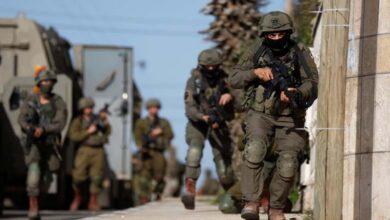“Military Indicators”: Israel Prepares the Ground for a Ceasefire in Lebanon

Tel Aviv has initiated new military measures to increase the likelihood of success for the U.S.-proposed ceasefire between Israel and Lebanon.
-
Israel plans to expand its ground operations in southern Lebanon
-
Lebanon Breaks Yom Kippur Taboos in Israel… Ongoing Attacks and Statements
The measures began on the ground with the removal of military roadblocks by the Israeli army in the border area with Lebanon on Sunday, according to Israeli army radio, which asked, “Are we heading towards the return of northern residents to their homes?”
At the onset of the war, the Israeli army requested tens of thousands of residents from towns near the Lebanese border to evacuate their homes and stay in hotels across Israel at the state’s expense. Approximately 70,000 Israelis are still displaced.
-
“Dismantling and Fortification”: Details of the US-Israel Agreement on the Invasion of Lebanon
-
Israel and the “Lebanon Truce”: The “Ministers’ Revolt” Undermines the “Biden-Macron” Proposal
Troop Withdrawal
The Israeli army radio reported plans to withdraw all soldiers from northern settlements and return them to bases and posts. Only civilian security forces, reservists, and local security officials will remain, along with available security systems.
The Lebanese government is reviewing the U.S. ceasefire proposal, which includes 12 key points. These include mutual acknowledgment by Israel and Lebanon of the importance of U.N. Resolution 1701, designating the Lebanese army as the sole armed force south of Lebanon, and Lebanese government oversight over arms sales or production to prevent the rearmament of unofficial armed groups.
-
From 1948 to 2024: A History of Wars Between Lebanon and Israel
-
Heaviest escalation between Hezbollah and Israel puts Lebanon on the brink of war
The proposal also calls for the dismantling of any non-compliant armed infrastructure by the Lebanese government. The U.S. and another nation would oversee the Israeli withdrawal. Within 60 days of signing the agreement, Lebanon would be required to disarm unofficial militias in the south.
Changes on the Ground
According to Israeli radio, after removing tanks, the army has also dismantled all military roadblocks along border routes, including roads previously closed due to anti-tank missile threats.
-
“Coordination and Intelligence”… This is how America cooperated with Israel in Lebanon’s strike
-
Violent Clashes Between Hezbollah and Israel Amid Preparations for Total War in Southern Lebanon
Israeli military sources stated, “The reality in the north has changed. There are no longer areas restricted to driving, and roads are open to civilian traffic.”
Despite this, residents remain hesitant to return due to ongoing rocket fire from Lebanon, with over 100 rockets hitting northern Israel daily.
-
“To Avoid U.S. Sanctions”: Israel Announces Expansion of Humanitarian Zone in Gaza
-
Gaza and Lebanon face the specter of death and famine… UN warnings and a deep humanitarian crisis
Positive Indicators
In another sign of progress, Israel’s public broadcasting authority reported that Prime Minister Netanyahu is holding security consultations tonight amid advancements in negotiations for a Lebanese agreement.
The U.S. has submitted a ceasefire proposal to Israel and Lebanon. While Israel appears inclined to accept it, both the U.S. and Israel await Lebanon’s response.
-
Israeli Airstrikes Do Not Exempt Sunni Towns in Lebanon
-
The Silent Catastrophe: A Quarter of Historic Buildings in Southern Lebanon Collapse in the Face of Israeli War
Intensified Strikes
Despite these positive signs, the Israeli army continues to expand its strikes, including in southern Beirut. Several areas, including villages in southern Lebanon, have been targeted by airstrikes.
Analysis on Gaza
Amos Harel, a military analyst for Haaretz, believes Netanyahu is considering a ceasefire in Lebanon, but there is no end in sight for the conflict in Gaza. He notes that while U.S.-encouraged negotiations progress, the Hezbollah group remains unwilling to limit its military capabilities along the border.












